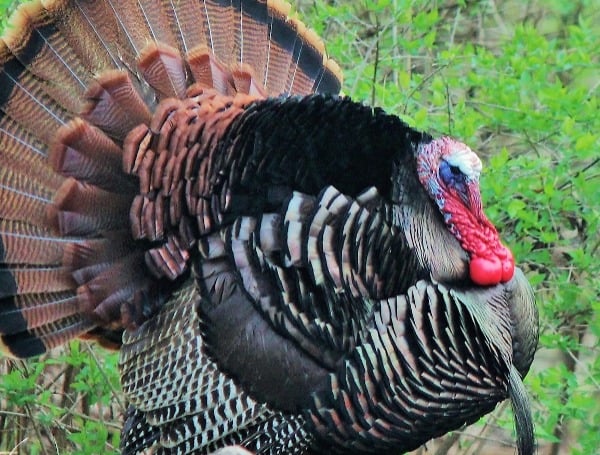There’s something awe-inspiring about turkey hunting on a spring morning in Florida. Maybe it’s the freshness of the early morning darkness. Or the r
There’s something awe-inspiring about turkey hunting on a spring morning in Florida. Maybe it’s the freshness of the early morning darkness. Or the rowdy chorus of birdlife at dawn.
The most likely explanation for what makes it so special, though, is hearing the gobble of a wild turkey booming across the landscape! For those of you who yearn for that experience, you don’t have long to wait.
The season dates are as follows on lands outside of the wildlife management area system:
While many wildlife management areas require a quota permit, there are over 40 that don’t. Before heading to a WMA you want to hunt, carefully review its regulations brochure. Some WMAs require a quota permit for a portion of their season while a daily quota permit issued from the check station is needed at others. In addition, area season dates, bag limits, shooting hours and other rules may vary from statewide seasons and other WMAs. Find a list of no-quota permit WMA hunting opportunities at MyFWC.com/Turkey and click on “2022 Spring Turkey Hunt Guide.”
Florida also has two Youth Spring Turkey Hunt Weekends, which are available to youth 15 years old and younger who are supervised by an adult.
- South of State Road 70: Feb. 26-27
- North of State Road 70: March 12-13
Youth hunt weekends occur on many WMAs and on lands outside of the WMA system. Learn more and find places to hunt by visiting MyFWC.com/Turkey and clicking on “Youth Turkey Hunt Weekends.”
Working for the Wild Turkey
Florida is home to two subspecies of wild turkey — the eastern and the Osceola or Florida wild turkey. The Osceola occurs only on the Florida peninsula, which makes the Sunshine State a popular destination for turkey hunters looking to complete a slam. Learn more about completing a slam at NWTF.org, by clicking on “Hunting,” then “Turkey Records” in the dropdown menu and “About Slams” button.
To ensure healthy wild turkey populations throughout Florida and provide sustainable hunting opportunities, the Florida Fish and Wildlife Conservation Commission’s (FWC) wild turkey management program continues to work on several objectives outlined in the strategic management plan including monitoring wild turkey abundance and distribution and improving wild turkey habitat on public lands.
Wild turkey hunters have been and continue to be important advocates of Florida’s wild turkey management program. Revenue from the turkey permit required to hunt wild turkeys in Florida (unless exempt) helps fund wild turkey research and management. Hunters also provide information through surveys and other wild turkey monitoring efforts and give their input during the rulemaking process for statewide and WMA hunting opportunities. The following summaries outline the progress FWC is making with support from turkey hunters.
Monitoring Wild Turkey Populations
The FWC relies on several methods to monitor wild turkey populations in Florida. Using harvest information and comparing it to hunter effort is an important way for biologists in Florida and throughout the country to monitor population trends. For over 30 years, the FWC has conducted an annual survey after spring turkey season to get a better understanding of turkey hunter effort, success and satisfaction. In 2020, the FWC replaced its traditional mail-in survey with a more efficient phone survey to get a higher response rate, more timely results and better accuracy because the survey is conducted immediately after turkey season to allow for improved hunter recall. The Wild Turkey Hunting Status Reports for 2020 and 2021, which show estimates for turkey hunter numbers, hunter-days afield, turkey harvested, hunter satisfaction and more, are available at MyFWC.com/Turkey.
Proposed Rule for Harvest Reporting
To provide biologists with more insights about the wild turkey harvest, the FWC proposed a rule amendment that would require logging and reporting harvested wild turkeys. This proposed rule was approved at the December 2021 Commission meeting and Commissioners will consider it for final adoption at their March 2022 meeting. If approved as a final rule, this requirement would apply to spring and fall wild turkey seasons and would take effect beginning with the fall turkey season in 2022. Harvest reporting would provide biologists with valuable data, such as the number of wild turkeys harvested during spring and fall seasons, when wild turkeys are being harvested, and from what county or WMA.
To learn more about this proposal and provide your feedback via an online commenting tool, visit MyFWC.com/Turkey and click on the banner that invites you to “Share Your Thoughts.”
Wild Turkey Summer Survey
Another way the FWC monitors populations is through the annual wild turkey summer survey. Beginning in 2019, Florida, along with many other states, asked hunters and other outdoor enthusiasts to report summer sightings of wild turkeys, especially poults. The primary goal of this monitoring effort is to get more information about wild turkey reproductive success as well as abundance and distribution. The data collected through the wild turkey summer survey complements the information from the harvest survey the FWC conducts each year after the spring season ends.
The next opportunity to take part in this annual wild turkey survey will run from June 1 to Aug. 31, 2022. Learn more by visiting MyFWC.com/Turkey and then scrolling down to the Wild Turkey Summer Survey tab.
Habitat Improvement Through the Wild Turkey Cost Share Program
Maintaining and improving habitat on public lands is vital for healthy wild turkey populations and Florida’s Wild Turkey Cost Share Program helps the FWC achieve that goal. This program is a partnership between the FWC, National Wild Turkey Federation and Florida Forest Service, with support from the Fish & Wildlife Foundation of Florida, to help provide funding for projects to manage wild turkey habitat on public lands. Turkey hunters are an important part of this effort. The money generated from the sale of turkey permits, which are required to hunt wild turkeys in Florida (unless exempt), allows the FWC to significantly contribute to the cost share program each year. Find more about this program at MyFWC.com/Turkey and scroll down to “Turkey Cost Share Program.”
Visit Tampafp.com for Politics, Tampa Area Local News, Sports, and National Headlines. Support journalism by clicking here to our GoFundMe or sign up for our free newsletter by clicking here.
Android Users, Click Here To Download The Free Press App And Never Miss A Story. Follow Us On Facebook Here Or Twitter Here.


COMMENTS